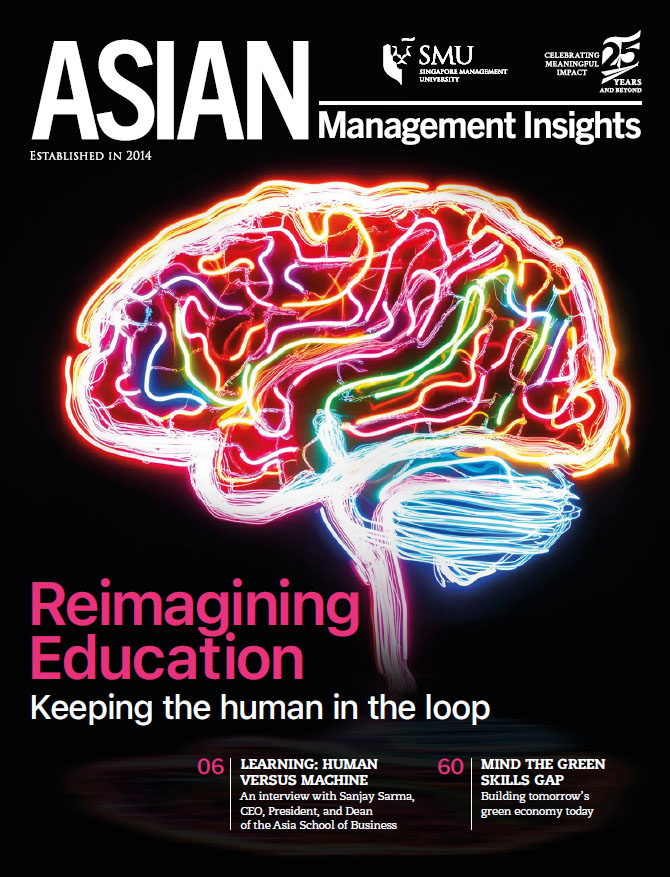Reforming adult and continuing education has become a key issue in an era defined by relentless change borne of constant technological advancements. The traditional education paradigm where instructors transfer knowledge to students–often likened to a pen writing on a blank page–is deemed insufficient to meet the needs of the 21st century. As curricula evolve, teachers need to learn new skills and even unlearn outdated ones to serve as mentors and facilitators in the classroom.
Throw in a form of artificial intelligence (AI) that is capable of doing tasks autonomously rather than as a human-operated tool, also referred to as agentic AI, and you have job transformations that lead to what Sanjay Sarma, CEO, President, and Dean of the Asia School of Business, Kuala Lumpur, Malaysia, calls “personal obsolescence”. In this issue’s At The Helm feature, the former Massachusetts Institute of Technology (MIT) Vice President for Open Learning advocates formalising ‘quaternary’ education– the lifelong, white-collar follow-up to primary, secondary and tertiary education–to cope with changing job skill demands. In an era where AI is increasingly agentic, Sarma urges human learning to reclaim agency and become AI-proof.
Incorporating the human experience into AI learning systems could deliver Sarma’s vision. Whereas one-size-fits-all teaching moves too fast for slower learners while leaving faster learners bored and unchallenged, Reinforcement Learning (RL) can be leveraged to help both instructors and learners. Pradeep Varakantham and Sidney Tio show how RL-based solutions can reduce teachers’ cognitive load while delivering to students a data-driven and personalised learning experience.
While AI has immense potential to do good, AI systems can be programmed to prioritise profit or efficiency at the expense of human agency and fairness. An understanding of behavioural psychology is useful in working out how AI influences human decision-making, says Seema Chokshi. More importantly, organisations can then design AI systems that uplift, rather than undermine, human beings.
Singapore’s SkillsFuture movement celebrates its 10th anniversary this year. As a national movement promoting lifelong learning and skills mastery, it has become the region’s gold standard in bridging skills gaps in the market. SkillsFuture Singapore Chief Skills Officer Gog Soon Joo explains how the country drives its efforts to upskill and reskill, while Shoeb Kagda details how Singapore’s Southeast Asian neighbours are doing the same to capitalise on their youthful workforce.
Skills for the green economy are covered in SkillsFuture’s range of courses, but there is already a widening green skills gap in the market, says Panchali Guha. Unless green skills are properly defined and taught, the lack of trained workers will put net zero goals at risk. Above all else, policy frameworks for green skills development must be put in place to set the wheels in motion.
Transition finance might be a valuable form of green expertise, given that current green financing practices directing capital away from carbon-intensive brown sectors could be hindering the achievement of green targets. Hao Liang, Yongheng Sun, and Tianhao Yao champion the merits of transition finance, which would fund brown industries’ efforts to address the dual challenge of reducing carbon emissions while maintaining economic growth.
The manufacturing of commercial vehicles is a brown industry, and it is a prominent one in India, the world’s largest manufacturer of buses and the third largest of trucks. Many foreign automobile companies have tried and failed to gain a footing in the market since it was opened up in 2002, earning it the nickname the ‘graveyard’ of global automotive players. Debjit Roy and Shubham list seven steps to achieve success in a market where plenty have failed.
Those companies would benefit from the skilled implementation of a clever strategy. While leaders may know the right things to be done, Robin Speculand spells out how organisations can do them right. More than just a good plan, successful implementation requires disciplined leadership that motivates staff to take the right actions.
In India, Infosys’ learning experience platform Wingspan delivered much-desired digital skills that made the company an employer of choice. Perhaps more importantly, it demonstrated to its clients its ability to walk the digital transformation talk. Adam Tatarynowicz, Wee-Kiat Lim, and Mahima Rao-Kachroo chronicle the creation and growth of Wingspan within and beyond Infosys in this issue’s Case in Point.
Social mobility offers the opportunity to secure a better life, but it can lead to a hypercompetitive environment and burnout. High levels of social mobility can also feed the ‘meritocracy myth’: success is the reward for those who hustle, and the lack thereof is the fruit of the less diligent. Jacinth Tan proposes not only a more inclusive form of social mobility that redefines success beyond wealth and status, but also the strengthening of social safety nets.
Finally, as we celebrate International Women’s Day 2025, we acknowledge Sharon Wong’s accomplishments. The founder of premium baby and mother product retailer Motherswork shares how a self-professed “hobby” turned into a multinational operation, why her staff stayed with her for more than 20 years, and her take on “having it all”.
And this issue of Asian Management Insight–centred on relearning and reskilling–arrives at the perfect moment as we celebrate Singapore Management University’s 25th anniversary, marking both our achievements and our exciting future ahead!
